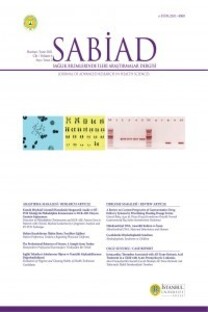DETERMINATION OF THE THERAPEUTIC EFFECT OF VULPINIC ACID AND VULPINIC ACID-RESPONSIVE miR-197-3P IN BREAST CANCER TREATMENT BY IN VITRO AND IN VIVO STUDIES
Vulpinic acid, Drug Candidate Molecule, miR-197-3p
DETERMINATION OF THE THERAPEUTIC EFFECT OF VULPINIC ACID AND VULPINIC ACID-RESPONSIVE miR-197-3P IN BREAST CANCER TREATMENT BY IN VITRO AND IN VIVO STUDIES
Vulpinic acid, drug candidate molecule, miR-197-3p,
___
- Grozescu T, Popa F. Prostate cancer between prognosis and adequate/proper therapy. J Med Life. 2017;10(1):5-12
- Yayın Aralığı: Yılda 3 Sayı
- Başlangıç: 2018
- Yayıncı: İstanbul Üniversitesi
CircRNAs OF SALIVA AS POTENTIAL BIOMARKERS FOR COLORECTAL CANCER DIAGNOSIS
Afet SATTAROVA, Milad ASADİ, Tayfun YOLDAŞ, Osman BOZBIYIK, Ahmad AL-OMAR, Can MUFTUOGLU, Ufuk MERT, Ayşe CANER
microRNA AS A PROMISING POTENTIAL BIOMARKER FOR COLORECTAL CANCER
Milad ASADİ, Ayşe CANER, Venus ZAFARİ, Ahmad AL-OMAR, Can MUFTUOGLU, Tuoraj ASVADİ KERMANİ
Semra DEMOKAN, Sena SEN, Onder ERYILMAZ, Sevde COMERT, Murat ULUSAN, Mehmet Nejat DALAY
LONG NON-CODING RNAs AND AUTOPHAGY IN OSTEOSARCOMA
Ayça COŞKUN, Hamza Malik OKUYAN
LIPOPOLYSACCHARIDE INHIBITS AUTOPHAGY IN HUMAN DERMAL FIBROBLASTS IN VITRO
Keyvan HEMMATVAND, Mehtap YUKSEL EGRİLMEZ, Ufkay KARABAY
miRNA-REGULATED PATHWAYS OF CD8+T CELLS IN TNBC MOUSE MODEL
Muge OCAL-DEMİRTAS, Doç. Dr. Bala GÜR DEDEOĞLU
Gizem ESENTÜRK, Can DORUK, Murat ULUSAN, Nejat Vakur OLGAÇ, Semra DEMOKAN
THERAPEUTIC IMPLICATIONS OF TARGETED SEQUENCING AND miRNA-SEQ OF B CELL LYMPHOMAS
Esra Esmeray SÖNMEZ, Tevfik HATİPOĞLU, Xiaozhou HU, Hongling YUAN, Ayça ERŞEN DANYELİ, Ayla ANAR ARICI, Ahmet ŞEYHANLI, Zühal ÖNDER SİVİŞ, Bengü DEMİRAĞ, Eda ATASEVEN, Dilek İNCE, Zekiye ALTUN, Safiye AKTAŞ, İnci ALACACIOĞLU, Tuğba SÜZEK, Nazan ÖZSAN, Taner Kemal ERDAĞ, Elvan Caglar CİTAK, Sermin ÖZ
miR-3653-3P EXPRESSION IN PERIPHERAL BLOOD OF PATIENTS WITH OVARIAN CARCINOMA
Fatma Seher PEKTOPAL DELEK, Demet AKDENİZ ÖDEMİŞ, Özge ŞÜKRÜOĞLU ERDOĞAN, Seda KILIÇ ERCİYAS, Büşra KURT, Şeref Buğra TUNÇER, Hülya YAZICI
